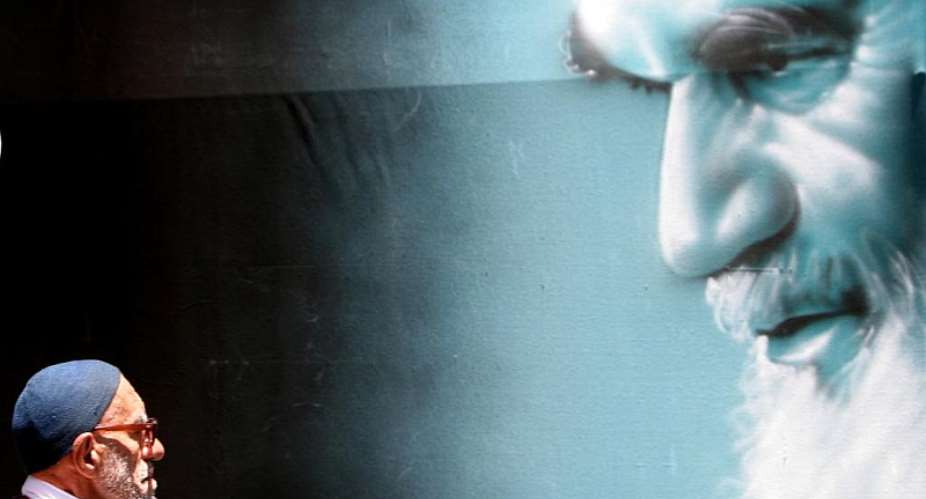On this day 40 years ago, 1 February 1979, the Iranian revolutionary cleric Ayatollah Ruhollah Khomeini left exile here in Paris to return to Tehran. Only weeks before Shah Mohammad Reza Pahlavi left Iran on a "vacation", that would in fact become the beginning of his own exile until his death in 1980.
The Shah's departure and the arrival of the fire-brand cleric Khomeini back on Iranian soil heralded the true beginning of the Islamic Revolution .
To mark this 40th anniversary of Khomeini's departure from Paris to Tehran, RFI spoke with François Nicoullaud who was France's ambassador to Iran from 2001 to 2005.
The Ayatollah came, reluctantly, to France after asylum deals with Iraq and Kuwait had been declared nul and void with the cleric. Paris was set to become the seat of the Iranian Revolutionary Council in exile under Khomeini, which seemed anathema when one looks back at relations beween France and Iran in the 1970s.
According to Nicoullaud, "it was an excellent relationship, a golden age. Iran felt it was in an immense sea of gold and didn't know exactly what to do with it". This in reference to the oil crises of the 1970s which saw the price of crude oil quadruple in the region.
And, both Germany and France had been given a priviliged position at the negotiating table, as Shah Pahlavi was eager to sign lucrative deals with Western powers.
So with high-stake deals on the table, and a revolutionary cleric being given sanctuary in France, how did the Iranian monarchy at the time feel about this?
"The Shah felt Khomeini was too close for comfort when he was in Iraq," says Nicoullaud. "His speeches were penetrating Iran, so he felt it would be better if [Khomeini] was further away. The Shah in fact was at the origin of his arrival in France".
But one striking issue is the vociferously secular nature of the French Republic. Why would France have become the choice of sanctuary for a religious radical? Nicoullaud believes the reason was quite simple.
"Intellectuals in France told him to come here. He wanted to go to a muslim country but [they] felt it better for him to be in a country where the international media could capture everything he would say and get the proper media support and coverage."
Although there was a popular distaste for the Shah's rule, democratic forces were active in Iran when he went into exile. And Khomeini's Revolutionary Council promised the establishment of a transitional government ahead of parliamentary elections.
When asked if France believed democratic groups would be integrated into the the revoultionary movement, Nicoullaud points out the base of the Ayatollah's support.
"Of course the poorest people were under the influence of the clergy. This is how the clergy came up. And in fact, as in every revolution - we had it in France with the Jacobins and the Girondins, the moderates and the extremists. We had it in Russia with the Mensheviks and the Bolsheviks.
"There is a short moment of unanimity at the beginning of the revolution, when everyone agrees to get rid of the tyrant. After that, all the groups enter into coflict, one with the other. And in the case of Iran, the religious won."
However, it has to be said that Ayatollah Khomeini believed in Muslim unity and solidarity and the spread of his revolution throughout the world. And indeed, crossing the sectarian divide between Shi'ia and Sunni , he called on both to be united and to stand firm against arrogant Western powers.
Which would have included France, surely? So did people in Paris buy into this?
"There were illusions at the beginning, with Khomeini in France," according to the former ambassador. "Khomeini's speech was on 'peace and love'. He appeared to international media and governments like a kind of guru, a kind of Gandhi, who would re-establish democracy and so on.
"In fact this language was precisely by those intellectuals around him to seduce international opinion. Khomeini didn't care about that at all."
For the full interview, click here





 Supreme court declares payment of wages to spouses of President, Vice President ...
Supreme court declares payment of wages to spouses of President, Vice President ...
 Publish full KPMG report on SML-GRA contract – Bright Simons to Akufo-Addo
Publish full KPMG report on SML-GRA contract – Bright Simons to Akufo-Addo
 Kumasi International Airport to begin full operations by end of June
Kumasi International Airport to begin full operations by end of June
 Election 2024: Our ‘real challenge’ is getting ‘un-bothered’ youth to vote – Abu...
Election 2024: Our ‘real challenge’ is getting ‘un-bothered’ youth to vote – Abu...
 [Full text] Findings and recommendations by KPMG on SML-GRA contract
[Full text] Findings and recommendations by KPMG on SML-GRA contract
 Renegotiate SML contract – Akufo-Addo to GRA, Finance Ministry
Renegotiate SML contract – Akufo-Addo to GRA, Finance Ministry
 J.B Danquah-Adu murder trial: Sexy Dondon to Subpoena Ken Agyapong, Ursula Owusu
J.B Danquah-Adu murder trial: Sexy Dondon to Subpoena Ken Agyapong, Ursula Owusu
 Galamsey: Five Burkinabes jailed 20 years each for mining
Galamsey: Five Burkinabes jailed 20 years each for mining
 'It's no crime' – Abu Sakara defends Alan's exit from NPP
'It's no crime' – Abu Sakara defends Alan's exit from NPP
 'We know all your houses, pay your bills now or we’ll disconnect you; we're all ...
'We know all your houses, pay your bills now or we’ll disconnect you; we're all ...
